Unit 4 Natural Disasters Discovering Useful Structures 课件(共25张PPT)-2025-2026学年人教版(2019)必修第一册
文档属性
| 名称 | Unit 4 Natural Disasters Discovering Useful Structures 课件(共25张PPT)-2025-2026学年人教版(2019)必修第一册 | 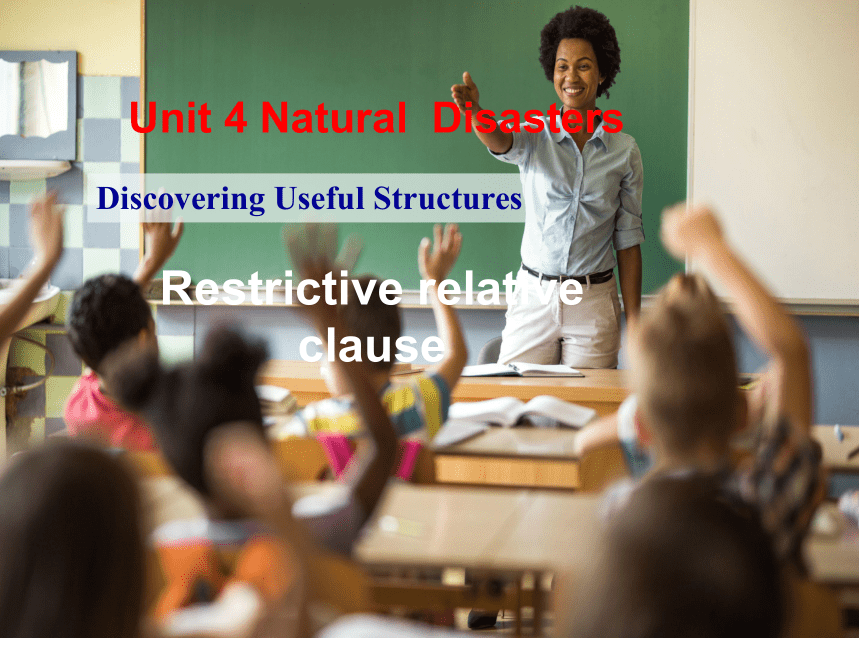 | |
| 格式 | pptx | ||
| 文件大小 | 7.6MB | ||
| 资源类型 | 教案 | ||
| 版本资源 | 人教版(2019) | ||
| 科目 | 英语 | ||
| 更新时间 | 2025-07-18 20:05:41 | ||
图片预览

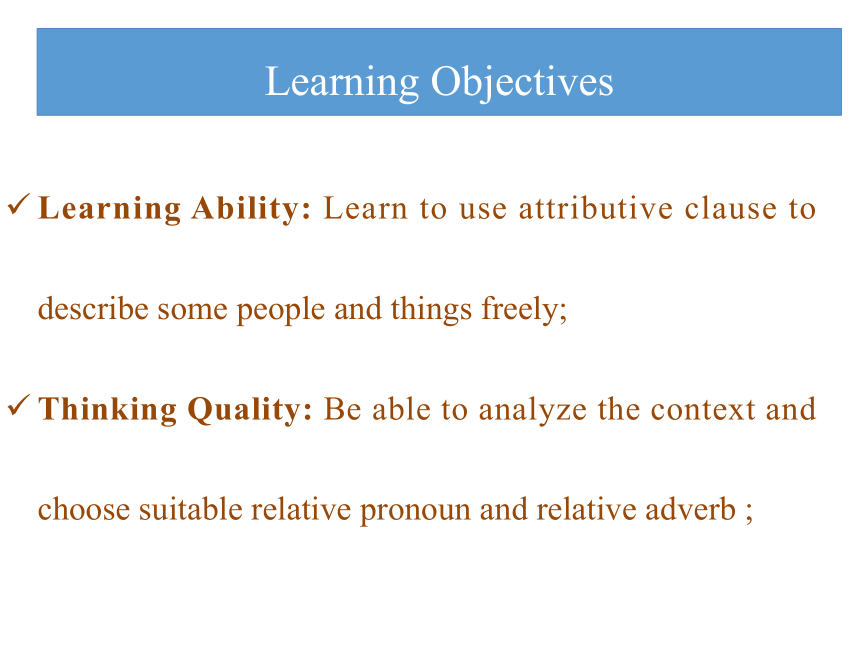
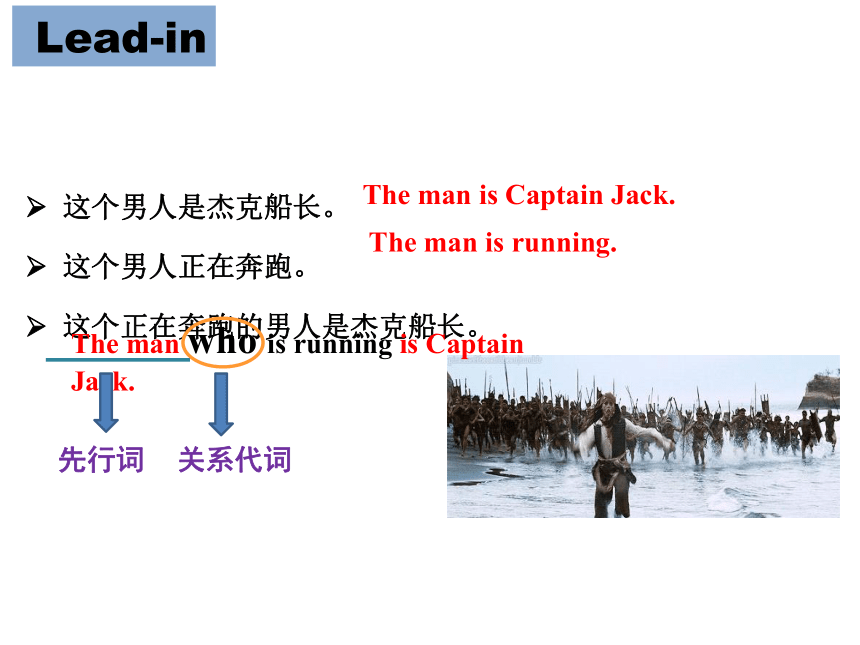
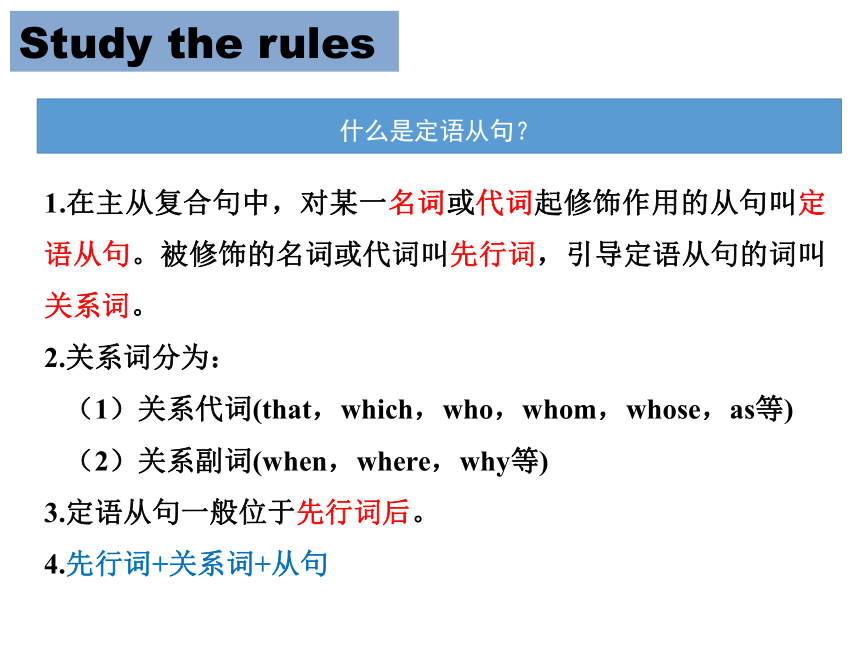
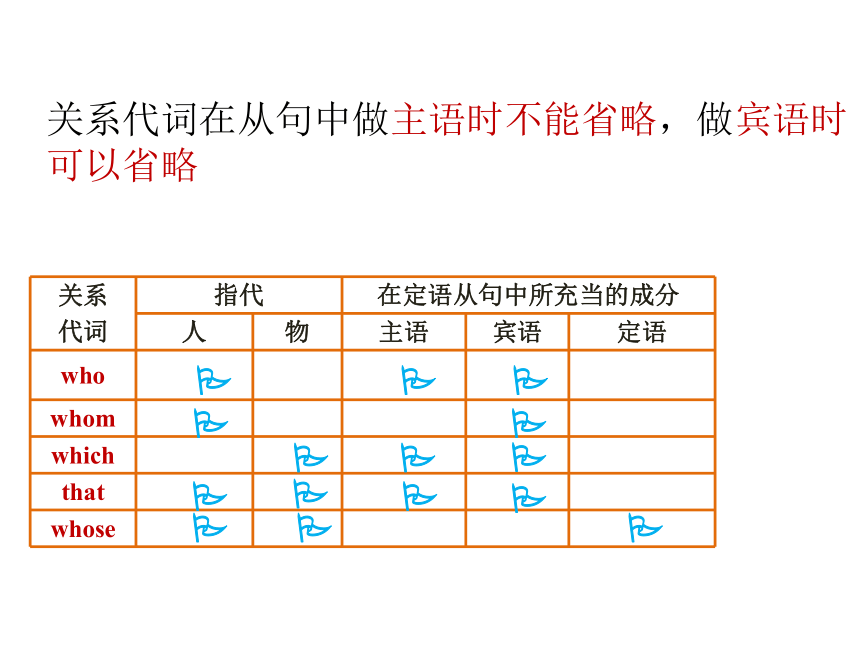
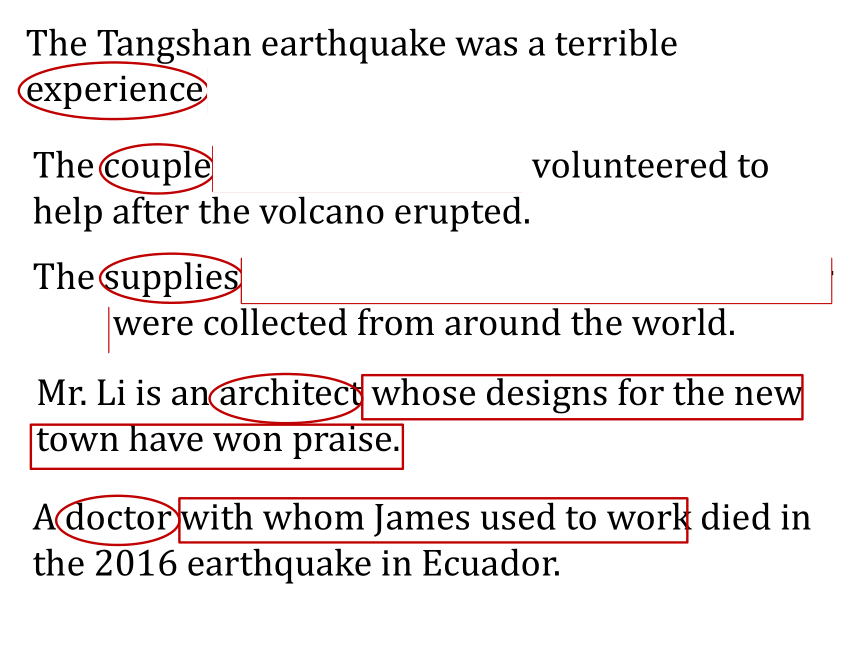
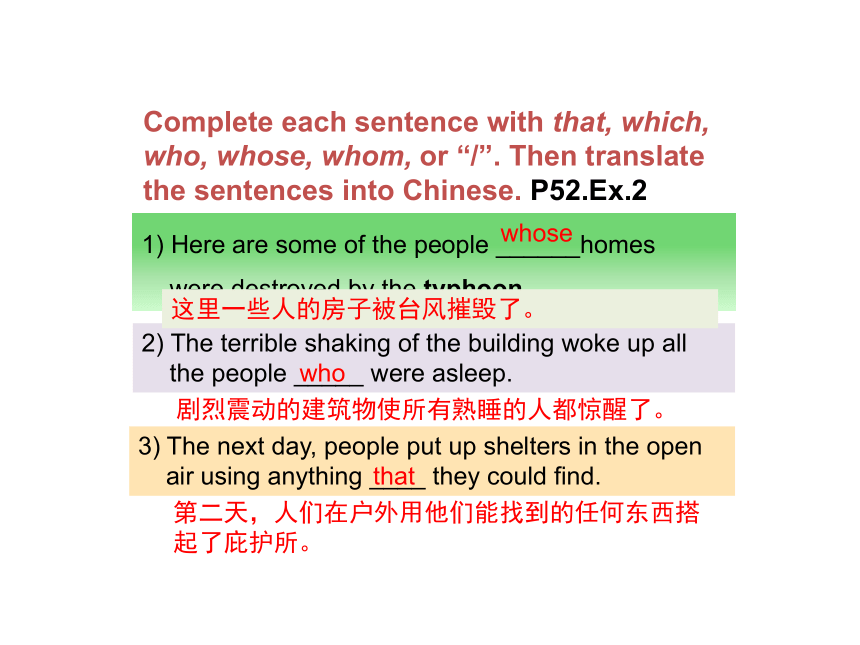
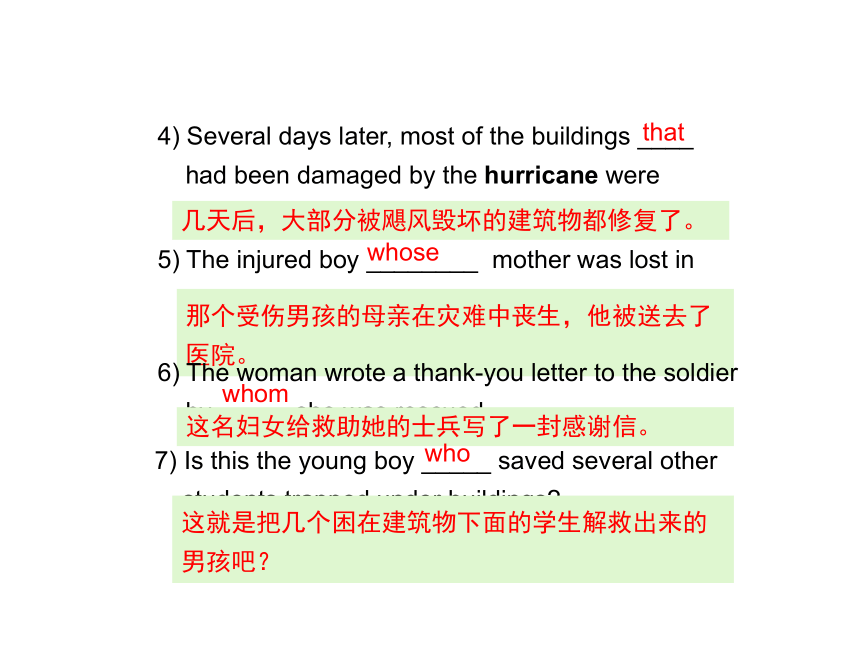
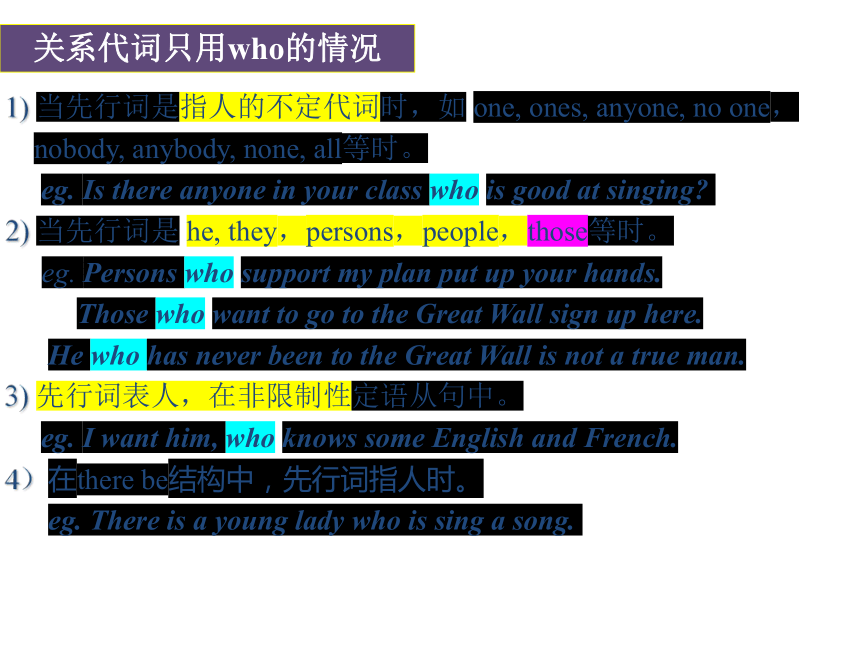
文档简介
(共25张PPT)
Discovering Useful Structures
Unit 4 Natural Disasters
Restrictive relative clause
Learning Ability: Learn to use attributive clause to describe some people and things freely;
Thinking Quality: Be able to analyze the context and choose suitable relative pronoun and relative adverb ;
Learning Objectives
这个男人是杰克船长。
这个男人正在奔跑。
这个正在奔跑的男人是杰克船长。
The man is Captain Jack.
The man is running.
The man who is running is Captain Jack.
先行词
关系代词
Lead-in
1.在主从复合句中,对某一名词或代词起修饰作用的从句叫定语从句。被修饰的名词或代词叫先行词,引导定语从句的词叫关系词。
2.关系词分为:
(1)关系代词(that,which,who,whom,whose,as等)
(2)关系副词(when,where,why等)
3.定语从句一般位于先行词后。
4.先行词+关系词+从句
Study the rules
什么是定语从句?
关系 代词 指代 在定语从句中所充当的成分 人 物 主语 宾语 定语
who
whom
which
that
whose
关系代词在从句中做主语时不能省略,做宾语时可以省略
The Tangshan earthquake was a terrible experience that my great-grandma cannot forget.
The couple who live next to us volunteered to help after the volcano erupted.
The supplies which were provided to the disaster area were collected from around the world.
Mr. Li is an architect whose designs for the new town have won praise.
A doctor with whom James used to work died in the 2016 earthquake in Ecuador.
2) The terrible shaking of the building woke up all
the people _____ were asleep.
3) The next day, people put up shelters in the open
air using anything ____ they could find.
Complete each sentence with that, which, who, whose, whom, or “/”. Then translate the sentences into Chinese. P52.Ex.2
1) Here are some of the people ______homes
were destroyed by the typhoon.
whose
who
that
这里一些人的房子被台风摧毁了。
剧烈震动的建筑物使所有熟睡的人都惊醒了。
第二天,人们在户外用他们能找到的任何东西搭起了庇护所。
5) The injured boy ________ mother was lost in
the disaster was taken to the hospital.
4) Several days later, most of the buildings ____
had been damaged by the hurricane were
repaired.
that
几天后,大部分被飓风毁坏的建筑物都修复了。
whose
那个受伤男孩的母亲在灾难中丧生,他被送去了医院。
6) The woman wrote a thank-you letter to the soldier
by _____ she was rescued.
whom
这名妇女给救助她的士兵写了一封感谢信。
7) Is this the young boy _____ saved several other
students trapped under buildings
who
这就是把几个困在建筑物下面的学生解救出来的男孩吧?
关系代词只用who的情况
1) 当先行词是指人的不定代词时,如 one, ones, anyone, no one,
nobody, anybody, none, all等时。
eg. Is there anyone in your class who is good at singing
2) 当先行词是 he, they,persons,people,those等时。
eg. Persons who support my plan put up your hands.
Those who want to go to the Great Wall sign up here.
He who has never been to the Great Wall is not a true man.
3) 先行词表人,在非限制性定语从句中。
eg. I want him, who knows some English and French.
4)在there be结构中,先行词指人时。
eg. There is a young lady who is sing a song.
1 )当先行词是all,little,much,none,everything,anything,nothing 等代词时。2)当先行词前面有the only,the very,the last等修饰时。
3)当序数词或形容词最高级修饰先行词时。
4)当先行词前面有only,all,any,no等修饰时。
5)当主句是以疑问词who或which开头的特殊疑问句时。
6)先行词既有人又有物时。
关系代词只用that的情况
区分:限制性定语从句和非限制性定语从句 根据定语从句与先行词关系的密切程度,定语从句可以分为限制性定语从句和非限制性定语从句,二者在用法和形式上的区别如下:
区分点 限制性定语从句 非限制性定语从句
限制程度 对先行词起修饰限定作用,不可或缺,去掉后对主句意思有影响 对先行词或主句起补充说明作用,去掉后主句意思仍然完整
句子结构 先行词与从句之间没有逗号 先行词与从句之间有逗号分开
翻译方式 多译成前置定语 多译成并列句
关系词的省略 作宾语的关系代词可以省略 任何关系词均不可省略,且不可用that
先行词的不同 先行词不可以是整个主句 先行词可以是整个主句
Practice: 课本 P56.
The people_________live in Wenchuan county will never forget the day 12 May 2008. The 8.0-magnitude earthquake_________killed over 80,000 people and left many more injured turned many towns and counties into ruins. The rescue work ___________followed was carried out by people from all over the country, and even abroad.
Now, more than 10 years on, the people___________suffered the earthquake are living a new life. Many live in new towns _________are earthquake-safe, in local communities _________have been beautifully rebuilt by the government. The people will never forget those _________rescued them and helped them rebuild their home. Out of gratitude, many young adults ________were students during the earthquake have chosen to study medicine or join the army in a wish to help more people.Wenchuan, the county ___________was completely destroyed and then completely rebuilt, has become a symbol of the Chinese spirit of never giving up.
who
which/that
who
who
which/that
which/that
which/that
which/that
who
优秀课件,精彩无限!关系副词先行词在从句中的成分when时间时间状语where地点地点状语whyreason原因状语关系副词引导的定语从句 1.when
I will never forget those days___________ we had great fun.
when
先行词是表时间的名词(time,day,week,month,year,etc.)
且【插入的部分】 在定语从句中作时间状语;
2.where
This is our school_________we study and make friends. .
where
先行词是表地点的名词(place, room, home, street, town, city, country, etc.)
且【插入的部分】 在定语从句中作地点状语;
eg.
I was trapped in an awkward atmosphere(一个尴尬的气氛)___________ my shorts was broken.
注意:当先行词为抽象地点时
where
抽象地点有:situation(处境)、case(情况)、stage(阶段)、atmosphere(气氛)、occasion(场合)等
3.why
③I can't believe the reason ____________ he was late.
why
先行词是reason;(只能是reason)
且【插入的部分】 在定语从句中作原因状语;
1. It was a time when people were divided geographically.
2. Emperor Qinshihuang united the seven major states into one unified country where the Chinese writing system began to develop in one direction.
3. There are many reasons why people learn a foreign language.
4. These were animal bones and shells on which symbols were carved by ancient Chinese people.
Practice
课本P64
When I started studying German, it was a struggle. The words felt strange on my tongue, and the grammar would not stay in my head. I told my mum that I wanted to give up, and that I would never live in a country ______ German was spoken. My mum told me that studying a language was not just for my future. lt was exercise for the brain;
where
n.舌头;语言
vi.&n.斗争;搏斗
课本P64
the more I learnt of a language, the more my brain would grow. And I remember that day _______ I suddenly felt like German was no longer a foreign language. It felt like my brain had doubled in size. I had finally come to a place ______ I could think in this foreign language, and I could see the world from a different point of view, I felt as if I had reached the goal _________ I had been fighting for. I could open a book and see meanings, not just a sea of words. I finally understood the reason _______ my mum had encouraged me not to give up. Thanks, Mum!
when
which/that
where
why
观点;看法
定语从句解题四步骤
1. 找出先行词
2. 把先行词代入从句中
3. 分析先行词在定语从句中的成分(做主语、宾语、定语或状语?)
4. 选择合适的关系词替换进去。
一找 二代 三分析 四选择
缺句子主要成分,用关系代词;不缺成分,作状语用关系副词
关系副词与关系代词的区分
1.The reason ________ I am unhappy is that I miss my hometown
2. I once lived in the mountain ______ the scenery is very beautiful .
3. I will never forget the time _______ My friends and I played happily.
4.The student ____________ answered the question is Zhang Hua.
5. I know the person ________ company produces new machine
why
where
when
who/that
whose
Practice:
6. The house ____________we’re going to visit was built a century ago.
The house ______________used to be a temple is a school now.
The house _______ he used to live was flooded.
7.A bookstore is a place_______ you can get books.
A bookstore is a place _______ books are sold.
A bookstore is a place _____________ sells books.
that/which
that/which
where
that/which
where
where
Summary
Thank You!
Discovering Useful Structures
Unit 4 Natural Disasters
Restrictive relative clause
Learning Ability: Learn to use attributive clause to describe some people and things freely;
Thinking Quality: Be able to analyze the context and choose suitable relative pronoun and relative adverb ;
Learning Objectives
这个男人是杰克船长。
这个男人正在奔跑。
这个正在奔跑的男人是杰克船长。
The man is Captain Jack.
The man is running.
The man who is running is Captain Jack.
先行词
关系代词
Lead-in
1.在主从复合句中,对某一名词或代词起修饰作用的从句叫定语从句。被修饰的名词或代词叫先行词,引导定语从句的词叫关系词。
2.关系词分为:
(1)关系代词(that,which,who,whom,whose,as等)
(2)关系副词(when,where,why等)
3.定语从句一般位于先行词后。
4.先行词+关系词+从句
Study the rules
什么是定语从句?
关系 代词 指代 在定语从句中所充当的成分 人 物 主语 宾语 定语
who
whom
which
that
whose
关系代词在从句中做主语时不能省略,做宾语时可以省略
The Tangshan earthquake was a terrible experience that my great-grandma cannot forget.
The couple who live next to us volunteered to help after the volcano erupted.
The supplies which were provided to the disaster area were collected from around the world.
Mr. Li is an architect whose designs for the new town have won praise.
A doctor with whom James used to work died in the 2016 earthquake in Ecuador.
2) The terrible shaking of the building woke up all
the people _____ were asleep.
3) The next day, people put up shelters in the open
air using anything ____ they could find.
Complete each sentence with that, which, who, whose, whom, or “/”. Then translate the sentences into Chinese. P52.Ex.2
1) Here are some of the people ______homes
were destroyed by the typhoon.
whose
who
that
这里一些人的房子被台风摧毁了。
剧烈震动的建筑物使所有熟睡的人都惊醒了。
第二天,人们在户外用他们能找到的任何东西搭起了庇护所。
5) The injured boy ________ mother was lost in
the disaster was taken to the hospital.
4) Several days later, most of the buildings ____
had been damaged by the hurricane were
repaired.
that
几天后,大部分被飓风毁坏的建筑物都修复了。
whose
那个受伤男孩的母亲在灾难中丧生,他被送去了医院。
6) The woman wrote a thank-you letter to the soldier
by _____ she was rescued.
whom
这名妇女给救助她的士兵写了一封感谢信。
7) Is this the young boy _____ saved several other
students trapped under buildings
who
这就是把几个困在建筑物下面的学生解救出来的男孩吧?
关系代词只用who的情况
1) 当先行词是指人的不定代词时,如 one, ones, anyone, no one,
nobody, anybody, none, all等时。
eg. Is there anyone in your class who is good at singing
2) 当先行词是 he, they,persons,people,those等时。
eg. Persons who support my plan put up your hands.
Those who want to go to the Great Wall sign up here.
He who has never been to the Great Wall is not a true man.
3) 先行词表人,在非限制性定语从句中。
eg. I want him, who knows some English and French.
4)在there be结构中,先行词指人时。
eg. There is a young lady who is sing a song.
1 )当先行词是all,little,much,none,everything,anything,nothing 等代词时。2)当先行词前面有the only,the very,the last等修饰时。
3)当序数词或形容词最高级修饰先行词时。
4)当先行词前面有only,all,any,no等修饰时。
5)当主句是以疑问词who或which开头的特殊疑问句时。
6)先行词既有人又有物时。
关系代词只用that的情况
区分:限制性定语从句和非限制性定语从句 根据定语从句与先行词关系的密切程度,定语从句可以分为限制性定语从句和非限制性定语从句,二者在用法和形式上的区别如下:
区分点 限制性定语从句 非限制性定语从句
限制程度 对先行词起修饰限定作用,不可或缺,去掉后对主句意思有影响 对先行词或主句起补充说明作用,去掉后主句意思仍然完整
句子结构 先行词与从句之间没有逗号 先行词与从句之间有逗号分开
翻译方式 多译成前置定语 多译成并列句
关系词的省略 作宾语的关系代词可以省略 任何关系词均不可省略,且不可用that
先行词的不同 先行词不可以是整个主句 先行词可以是整个主句
Practice: 课本 P56.
The people_________live in Wenchuan county will never forget the day 12 May 2008. The 8.0-magnitude earthquake_________killed over 80,000 people and left many more injured turned many towns and counties into ruins. The rescue work ___________followed was carried out by people from all over the country, and even abroad.
Now, more than 10 years on, the people___________suffered the earthquake are living a new life. Many live in new towns _________are earthquake-safe, in local communities _________have been beautifully rebuilt by the government. The people will never forget those _________rescued them and helped them rebuild their home. Out of gratitude, many young adults ________were students during the earthquake have chosen to study medicine or join the army in a wish to help more people.Wenchuan, the county ___________was completely destroyed and then completely rebuilt, has become a symbol of the Chinese spirit of never giving up.
who
which/that
who
who
which/that
which/that
which/that
which/that
who
优秀课件,精彩无限!关系副词先行词在从句中的成分when时间时间状语where地点地点状语whyreason原因状语关系副词引导的定语从句 1.when
I will never forget those days___________ we had great fun.
when
先行词是表时间的名词(time,day,week,month,year,etc.)
且【插入的部分】 在定语从句中作时间状语;
2.where
This is our school_________we study and make friends. .
where
先行词是表地点的名词(place, room, home, street, town, city, country, etc.)
且【插入的部分】 在定语从句中作地点状语;
eg.
I was trapped in an awkward atmosphere(一个尴尬的气氛)___________ my shorts was broken.
注意:当先行词为抽象地点时
where
抽象地点有:situation(处境)、case(情况)、stage(阶段)、atmosphere(气氛)、occasion(场合)等
3.why
③I can't believe the reason ____________ he was late.
why
先行词是reason;(只能是reason)
且【插入的部分】 在定语从句中作原因状语;
1. It was a time when people were divided geographically.
2. Emperor Qinshihuang united the seven major states into one unified country where the Chinese writing system began to develop in one direction.
3. There are many reasons why people learn a foreign language.
4. These were animal bones and shells on which symbols were carved by ancient Chinese people.
Practice
课本P64
When I started studying German, it was a struggle. The words felt strange on my tongue, and the grammar would not stay in my head. I told my mum that I wanted to give up, and that I would never live in a country ______ German was spoken. My mum told me that studying a language was not just for my future. lt was exercise for the brain;
where
n.舌头;语言
vi.&n.斗争;搏斗
课本P64
the more I learnt of a language, the more my brain would grow. And I remember that day _______ I suddenly felt like German was no longer a foreign language. It felt like my brain had doubled in size. I had finally come to a place ______ I could think in this foreign language, and I could see the world from a different point of view, I felt as if I had reached the goal _________ I had been fighting for. I could open a book and see meanings, not just a sea of words. I finally understood the reason _______ my mum had encouraged me not to give up. Thanks, Mum!
when
which/that
where
why
观点;看法
定语从句解题四步骤
1. 找出先行词
2. 把先行词代入从句中
3. 分析先行词在定语从句中的成分(做主语、宾语、定语或状语?)
4. 选择合适的关系词替换进去。
一找 二代 三分析 四选择
缺句子主要成分,用关系代词;不缺成分,作状语用关系副词
关系副词与关系代词的区分
1.The reason ________ I am unhappy is that I miss my hometown
2. I once lived in the mountain ______ the scenery is very beautiful .
3. I will never forget the time _______ My friends and I played happily.
4.The student ____________ answered the question is Zhang Hua.
5. I know the person ________ company produces new machine
why
where
when
who/that
whose
Practice:
6. The house ____________we’re going to visit was built a century ago.
The house ______________used to be a temple is a school now.
The house _______ he used to live was flooded.
7.A bookstore is a place_______ you can get books.
A bookstore is a place _______ books are sold.
A bookstore is a place _____________ sells books.
that/which
that/which
where
that/which
where
where
Summary
Thank You!
